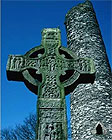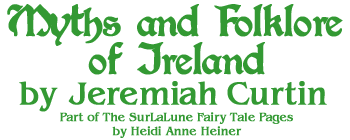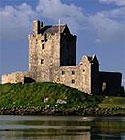


Myths
and Folklore of Ireland
by Jeremiah Curtin
The
Son of the King of Erin and the Giant of Loch Lein
The
Three Daughters of King O'Hara
The
Weaver's Don and the Giant of the White Hill
The
King of Erin and the Queen of the Lonesome Island
The
Shee an Gannon and the Grugach Gaire
The
Three Daughters of the King of the East and the Son of a King in Erin
The
Fisherman's Son and the Grugach of Tricks
The
Thirteenth Son of the King of Erin
Fin
MacCumhail and the Fenians of Erin in the Castle of Fear Dubh
Fin
MacCumhail and the Knight of the Full Axe
Gilla
na Grakin and Fin MacCumhail
Fin
MacCumhail The Seven Brothers and the King of France
Fin
MacCumhail and the Son of the King of Alba
Notes
Notes
Aedh Curucha (Aedh Crochtha), Hugh, the "suspended" or "hung up." As Aedh means also a fire-spark as well as the modern name Hugh, Aedh Curucha means the hung up or suspended fire-spark.
Alba, former name of Scotland.
Bar an Suan,
"pin of slumber." met with frequently in Gaelic mythology, is
found among the Slavs, but not so often. It appears in a Russian story,-
one of the most beautiful in European folklore.
Cesa MicRi na Tulach, "Cesa, son of
the king of the hill," said by my Donegal informant to be a small
dark-gray bird.
Curucha na Gros (Crochtha na g-cros), "hung
on the crosses," is a very interesting name, as is also that of the
father of Fair, Brown, and Trembling, Aedh Curucha, q.v.
Conan Maol MacMorna, the Gaelic Thersites,
always railing, causing trouble, unpopular, and attracting attention.
This species of person is as well known in the mythology of the North
American Indians as in Aryan myths.
Diachbha (pronounced Dyeeachva), "divinity,"
or the working of a power outside of us in shaping the careers of men
; fate.
Diarmuid (pronounced Dyeearmud), the final
d sounded as if one were to begin to utter y after it), one of the most
remarkable characters in Gaelic mythology, a great hunter and performer
of marvellous feats. The prominent event of his life was the carrying
off of Grainne, bride of Fin MacCumhail, at her own command. After many
years of baffled pursuit, Fin was forced to make peace; but he contrived
at last to bring about Diarmuid's death by causing him to hunt an enchanted
boar of green color and without ears or tail. The account of this pursuit
and the death of Diarmuid forms one of the celebrated productions of Gaelic
literature. Diarmuid had a mole on his forehead, which he kept covered
usually; but when it was laid bare and a woman saw it, she fell in love
with him beyond recall. This was why Grainne deserted Fin, not after she
was married, but at the feast of betrothal. The evident meaning of the
word is "bright" or "divine-weaponed." It is very
interesting to find Diarmuid called also Son of the Monarch of Light,
in another story.
Donoch Kam cosa, " Donoch, crooked
feet."
Draoiachta (pronounced Dreeachta), "Druidism,"
or "enchantment."
Erineach, or Eirineach, "a
man of Erin."
Gil an Og, "water of youth."
Gilla na Grakin
(Gilla na g-croicean), "the fellow
(or youth) of the skins," - i. e., the serving man of the skins.
This word " Gilla" enters into the formation of many Gaelic
names, such as Gilchrist, Gilfillin, MacGillacuddy.
Gruagach (pronounced Grooagach), "the
hairy one," from grœag, hair. "We are more likely to be
justified in finding a solar agent concealed in the person of the laughing
Gruagach or the Gruagach of tricks than in many of the sun-myths put forth
by some modern writers.
Inis Caol, "light island," - i.
e., not heavy.
Iron-back-without-action (Ton iaran gan tapuil).
Knock an Ar, "hill
of slaughter," a mountain near the mouth of the Shannon in Kerry.
Lun Dubh MacSmola, "blackbird,"
son of thrush.
Mal MacMulan. Mulcan in this name is evidently
Vulcan, substituted for some old Gaelic myth-power.
Oisin. In the Gaelic of Ireland this name
is accented on the last syllable ; in that of Scotland on the first, which
gives in English Ossian, the poet made known to the world by Macpherson.
The poems of Ossian are of course nothing more nor less than the ballads
of Fin MacCumhail and the Fenians of Erin, taken from Ireland to Scotland
by the Gael when they settled in the latter country, and modified in some
degree by Macpherson. Oisin is pronounced Usheen in Ireland, u sounded
as in but.
Ri Fohin (Ri fo thuinn), "king
under the wave."
Sean Ruadh, "John the Red," pronounced
Shawn Roo.
Tiscan (pronounced Tishyan; as in pan),
" envy." Son of King Tisean means "Son of King Envy."
Urfieist. rhis word is made up of Ur and
peist. Ur is kindred with the German Ur, and in a compound like this means
the " original '' or '' greatest.'' Peist -worm,'' ' beast,"
" monster'' is changed to feist here, according to a rule of aspiration
in Gaelic grammar.
Curtin,
Jeremiah. Myths and Folk-lore of Ireland. Boston:
Little, Brown
& Co., 1890. (Also London: Sampson Low, Marston, Searle & Rivington, 1890.)
Amazon.com: Buy the book in paperback.
©Heidi
Anne Heiner, SurLaLune Fairy Tales
E-mail: surlalune@aol.com
Page last updated June 1, 2005
www.surlalunefairytales.com






